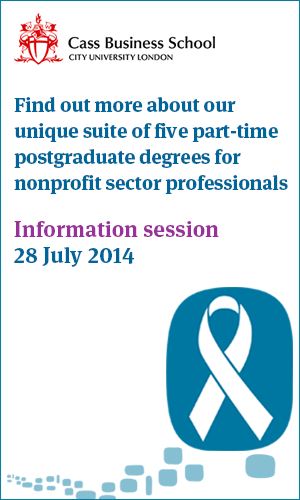NEWS – section 3
Is Charitable Incorporated Organisation status for you?
Law firm Lee Bolton Monier-Williams wants existing charities to think about whether they should adopt Charitable Incorporated Organisation status, and anyone setting up a new charity to consider the appropriateness of the new status. The opportunity has become more prominent as the availability of the status is being phased in, but certain issues remain unclear.
At a seminar held by the law firm in association with solicitors Turcan Connell, it was pointed out that the charity sector is waking up to the availability of the new status. So far 1,144 charities have registered as CIOs (as at the end of January 2014) accounting for approximately a quarter of all new charity registrations.
The intention of CIO status, as pointed out at the seminar by Lee Bolton Monier-Williams' Frances Godden, is to provide a bespoke corporate form intended purely for charities, the benefits of incorporation and registration and a simplified regulatory regime.
The key difference between simply registering a charity as a company with Companies House and going for CIO status is that an incorporated charity has to comply with two sets of regulations - those from Companies House and those from the Charity Commission. CIOs only have to report to the Charity Commission.
The reality of this is that the annual return and accounts only have to be filed with the Charity Commission, no "Directors Report" is required, and there are less onerous accounting requirements (SORP depending on income). For a growing number of charities this would make life a lot less expensive - many incorporated charities are late with their filings for Companies House and fines for late filings have increased in severity, hard-won donations being wasted in this way.
Interestingly at a time when there is increasing consolidation in the sector, as Godden pointed out, for charities involved in mergers and reconstructions, CIO status offers simpler provisions.
However, among the disadvantages of the new CIO status is that it could cause problems when borrowing money as banks haven't yet got to grips with certain aspects. It offers limited security to lenders. There is no register of charges at the Charity Commission, and no means of offering a debenture or secured charges over assets for borrowing. If fixed or floating charges are already in place conversion may not be possible or practical. Trustees may be called upon to offer personal guarantees.
Also, says Godden, care should be taken in relation to existing contracts. A change of control may be triggered; novations and re-registration of property may be triggered. Indeed there are quite a few property issues to be considered, according to her LBMW colleague Lee Coley. These relate to: starting a new charity, permanent endowment and converting charities, amalgamation, purchase/disposal of property, and dissolution. Overall, much is unknown about how the new CIO status will work in practice.
CIO status has attractions for independent schools
CIOs are relevant to the independent schools sector, but not to the state sector where the status does not apply, it emerged at a seminar on the subject arranged by law firm Lee Bolton Monier-Williams. According to partner Howard Dellar, the question to be addressed is whether the CIO is a better corporate vehicle for a school than a company. He says that one should consider the key characteristics of CIOs in the context of the size and activities of each school.
CIO status enables an independent school to be free from company law, regulations, meetings and terminology, while at the same time offering full corporate status with limited liability. It enables continuous asset ownership and the ability to hold permanent endowment. And there are less onerous accounting and reporting requirements compared to company status. But there remains the unresolved issue of not being able to offer banks security.
Dellar pointed out that within the independent schools sector even though CIO may not be the appropriate structure for the school itself, there are related bodies for which it may be suited: out of school clubs, pre-schools, supporting/fundraising charities and foundations for prizes, legacies, scholarships, etc. The status will also assist in the recruitment of trustees and committee members due to the limitation of liability. Also attractive is the possibility of a simple structure with clear governance.
Scottish experience shows interest in CIO status
New Scottish charities like the status of Charitable Incorporated Organisation, it was revealed at a seminar in Westminster held by law firms Lee Bolton-Monier Williams and Turcan Connell. Scotland has already had the status in operation for a while, earlier than in the rest of the UK. Yes, there were initial fears about take-up but these have been allayed, according to Turcan Connell charities partner Simon Mackintosh.
Of all new charity applications, 33% are now for Scottish Charitable Organisation Status - there are around 1200 to 1300 applications each year. 50% of Scottish charities are still unincorporated associations and most conversions to SCIO status are by unincorporated associations. Thus, as Mackintosh, points out, the demand for the new status iin Scotland is really coming from completely new charities.
Initial fears about recognition of the status in Scotland have proved to be unfounded although banks continue to be tricky in some cases. Generally, Mackintosh says that in terms of detail and administration converting charities can't take anything for granted. For example, while the regulations help with the vesting of assets, vesting does not amount to a formal transfer, if that is required. He also warns that charities often fail to appreciate that certain follow-up actions are necessary.
Scotland's charities confident about the future
A survey conducted by accountancy firm, Scott-Moncrieff has found a renewed confidence amongst Scottish charities, with 94% responding that they are confident about the long term financial sustainability of their organisation. Within that 94%, 35% stated that they were "very" confident, and 59% were "quite" confident. The remaining 6% of respondents were "not very" confident.
Gillian Donald, charities partner at Scott-Moncrieff, says: “This was a surprising result. We didn’t expect confidence to be quite as high, but we’re pleased to hear that the sector is feeling buoyant.
"Much of this could come from the fact that charities, especially those which are dependent on government services and funding, have really struggled over the past few years, but have managed to turn the resilience they’ve needed during that time to confidence for the future. If they’ve made it this far, then they’re feeling positive about keeping going.”
When asked about the main challenge to their financial sustainability, two issues came out on top, with "cuts to funding (by government or local authority)" and "stretched management resources" creating the biggest issues for the sector, reported by 28% and 17% respectively.
Other issues mentioned were: lack of time for creative thinking (7%); capacity for change management (12%); re-tendering for services (11%); effective identification and management of risk (9%). The remaining 13% of respondents highlighted a mix of other issues including falling donations and memberships, staff cost pressures and economic performance affecting investments.
Donald says: “The charity sector in Scotland has survived, if not entirely prospered, over the past few years. Furthermore, the fact that the survey responses were made with the knowledge of further significant cuts to be made this year, provides an encouraging snapshot of the mood across the sector.
“Those charities dependent on private donations and public fundraising will be buoyed by the general upturn in the economy, and those which invest will benefit from increased portfolio yields as the markets regain lost ground.
“Ironically, the last few years have really boosted the strength of the sector; if not financially, certainly in terms of its ability to survive and find new, creative solutions. A new focus on improved use of technology, entering into consortium bids, seeking loan/grant hybrid funding and operating under a culture of continuous improvement will all stand the sector in good stead as we move forward.”
Corporate sponsor for charity's running events
Deloitte has entered into a three year partnership with the Royal Parks Foundation, as the official corporate sponsor of the charity's annual running events in October. The accountancy and business consultancy firm will be the title sponsor of the corporate categories of the Royal Parks Foundation Half Marathon (13.1 miles) and the Royal Parks Foundation Ultra (50 kilometres).
David Barnes, managing partner for public policy and corporate responsibility at Deloitte, says: "The Royal Parks Foundation Half and Ultra are both exceptionally tough but rewarding events for all those involved. We recognise the value of these challenges for corporate entrants in generating healthy competition between colleagues, whilst fundraising for some fantastic charitable causes.
"It is the perfect opportunity to encourage our own people to engage with each other in an environment outside the office and push themselves to achieve new goals, whilst raising money for our national charity partners - Alzheimer’s Society, Mind and Prostate Cancer UK. We hope we can encourage many other organisations to do the same."
Poor data management not addressed by charities
96% of not for profit (NFP) organisations, particularly charities, are struggling to manage, decipher and capitalise on the data they hold about their members and supporters, according to research by Advanced Business Solutions.
Almost all (96%) of respondents say they could make better use of the data they already have with most not having accurate data about organisational effectiveness, marketing effectiveness, service users or projects, their members and or supporters, employees and even finances.
Data management and storage methodologies vary widely between not for profit organisations and many face a daily struggle to report in a consistent and effective way. 87% enter the same data more than once and 80% have difficulty producing reports that require data from different systems. As a result, 78% report conflicting data and 69% have difficulty understanding data or reports from different parts of the organisation.
Simon Fowler, managing director of Advanced Business Solutions, says: “In this highly digitalised, data-centric environment, organisations that can extract behavioural insights from customer data and transform them into ‘sticky’ services, will be in a stronger position to attract new supporters, as well as engage and retain existing audiences. An inability to manage data to gain a competitive advantage is the single biggest threat facing NFPs right now. They risk trailing behind in this data-driven era.”
The report also reveals that the trend of incremental technology investment has left NFPs with a tangled network of disparate system that are not integrated. 66% report no integration between front and back office systems, and 60% say they have no overarching CRM/data management plan for the organisation. These factors impact on the way NFP organisations are managed internally, becoming barriers to driving efficiencies.
Whilst the majority of respondents understood the importance of resolving these issues, Advanced Business Solutions says it is clear resources, skills and time are not luxuries NFPs can afford. 81% say they do not have spare capacity to make changes with 72% already working on other critical projects. Unsurprisingly, many (71%) cite lack of funds as a key barrier but lack of skills and expertise also play a large part (60%).
Lack of talent development in charities
Research from non-profit graduate scheme Charityworks has identified what it says is a concerning lack of talent development within the sector, as the Cabinet Office injects £95,000 into the programme to boost graduate recruitment.
Research by Charityworks found that the majority of charities surveyed labelled talent development as the non-profit sector’s “Achilles heel”, while over 80% said their organisation does not prioritise talent highly enough.
Talent was cited as the most important ingredient in delivering organisational aims by one in three respondents, while 88% said it was very important.
The £94,000 government funding means Charityworks can expand its offer to more charities and housing associations across the UK, and more than treble the number of opportunities available to graduates looking to start a career in the sector from September 2014.
Nick Hurd MP, Minister for Civil Society, says: “Following Dame Mary Marsh’s review into skills and leadership in the social sector last year, it was clear that the sector was missing the type of strategic graduate offer so common in other sectors.
“Ensuring non-profits have a workforce that is capable of tackling the social issues of the future is extremely important and we want to support them to have that. With a proven track record in sourcing effective talent, whilst saving organisations money, Charityworks is a model that is well placed to begin to solve the sector’s ongoing challenges.”







